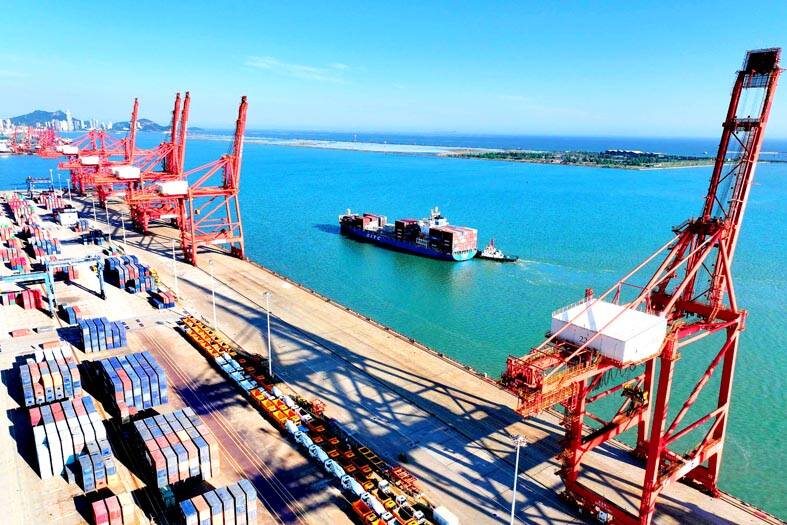China’s economy expanded more than 5 percent in the second quarter, official data showed yesterday, buoyed by strong exports, but analysts said that more work was needed to address sluggish consumer demand.
The country’s GDP grew 5.2 percent year-on-year during the April-to-June quarter, matching a prediction by an Agence France-Presse survey of analysts and topping an official growth goal for the year set by the government.
However, it marked a slowdown from the first quarter’s 5.4 percent growth, which was boosted by exporters rushing to shift goods ahead of high US tariffs.

Photo: AFP
“The national economy withstood pressure and made steady improvement despite challenges,” National Bureau of Statistics Deputy Director Sheng Laiyun (盛來運) told a news conference in Beijing.
“Production and demand grew steadily, employment was generally stable, household income continued to increase, new growth drivers witnessed robust development and high-quality development made new strides,” he said.
Markets were mixed in response — after a strong start to the day, Hong Kong pared an early rally, while Shanghai dipped into negative territory.
“The figures probably still overstate the strength of growth,” Capital Economics economist Huang Zichun (黃子春) said in a note.
“With exports set to slow and the tailwind from fiscal support on course to fade, growth is likely to slow further during the second half of this year,” Huang added.
Retail sales rose 4.8 percent year-on-year last month, below a forecast in a Bloomberg survey of economists, suggesting efforts to kick-start consumption have fallen flat.
Meanwhile, factory output gained 6.8 percent, higher than the estimate — reflecting continued high demand for Chinese exports that has boosted growth.
However, analysts said that strong exports could be driving deflationary pressures and further dampening already sluggish consumer demand.
Data last week showed that consumer prices edged up last month, barely snapping a four-month deflationary dip, but factory gate prices dropped at their fastest clip in nearly two years.
“Recent efforts to boost spending, such as the broadening of the consumer goods trade-in scheme earlier this year, did temporarily lift retail sales,” Moody’s Analytics economist Sarah Tan said. “However, this support proved unsustainable, with funding reportedly drying up in several provinces. The scheme’s limitations highlight the need for policymakers to address the deeper structural challenges behind consumer caution.”

In Italy’s storied gold-making hubs, jewelers are reworking their designs to trim gold content as they race to blunt the effect of record prices and appeal to shoppers watching their budgets. Gold prices hit a record high on Thursday, surging near US$5,600 an ounce, more than double a year ago as geopolitical concerns and jitters over trade pushed investors toward the safe-haven asset. The rally is putting undue pressure on small artisans as they face mounting demands from customers, including international brands, to produce cheaper items, from signature pieces to wedding rings, according to interviews with four independent jewelers in Italy’s main

Japanese Prime Minister Sanae Takaichi has talked up the benefits of a weaker yen in a campaign speech, adopting a tone at odds with her finance ministry, which has refused to rule out any options to counter excessive foreign exchange volatility. Takaichi later softened her stance, saying she did not have a preference for the yen’s direction. “People say the weak yen is bad right now, but for export industries, it’s a major opportunity,” Takaichi said on Saturday at a rally for Liberal Democratic Party candidate Daishiro Yamagiwa in Kanagawa Prefecture ahead of a snap election on Sunday. “Whether it’s selling food or

CONCERNS: Tech companies investing in AI businesses that purchase their products have raised questions among investors that they are artificially propping up demand Nvidia Corp chief executive officer Jensen Huang (黃仁勳) on Saturday said that the company would be participating in OpenAI’s latest funding round, describing it as potentially “the largest investment we’ve ever made.” “We will invest a great deal of money,” Huang told reporters while visiting Taipei. “I believe in OpenAI. The work that they do is incredible. They’re one of the most consequential companies of our time.” Huang did not say exactly how much Nvidia might contribute, but described the investment as “huge.” “Let Sam announce how much he’s going to raise — it’s for him to decide,” Huang said, referring to OpenAI

The global server market is expected to grow 12.8 percent annually this year, with artificial intelligence (AI) servers projected to account for 16.5 percent, driven by continued investment in AI infrastructure by major cloud service providers (CSPs), market researcher TrendForce Corp (集邦科技) said yesterday. Global AI server shipments this year are expected to increase 28 percent year-on-year to more than 2.7 million units, driven by sustained demand from CSPs and government sovereign cloud projects, TrendForce analyst Frank Kung (龔明德) told the Taipei Times. Demand for GPU-based AI servers, including Nvidia Corp’s GB and Vera Rubin rack systems, is expected to remain high,